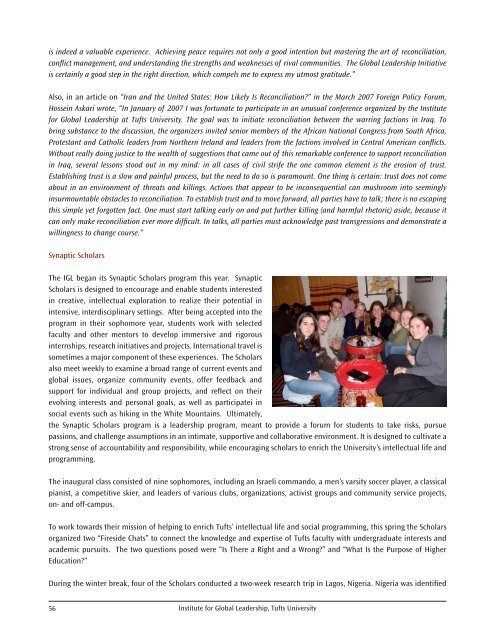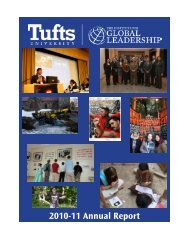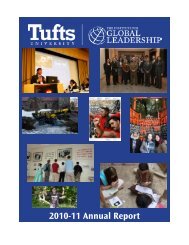Download - Institute for Global Leadership
Download - Institute for Global Leadership
Download - Institute for Global Leadership
You also want an ePaper? Increase the reach of your titles
YUMPU automatically turns print PDFs into web optimized ePapers that Google loves.
is indeed a valuable experience. Achieving peace requires not only a good intention but mastering the art of reconciliation,<br />
conflict management, and understanding the strengths and weaknesses of rival communities. The <strong>Global</strong> <strong>Leadership</strong> Initiative<br />
is certainly a good step in the right direction, which compels me to express my utmost gratitude.”<br />
Also, in an article on “Iran and the United States: How Likely Is Reconciliation?” in the March 2007 Foreign Policy Forum,<br />
Hossein Askari wrote, “In January of 2007 I was <strong>for</strong>tunate to participate in an unusual conference organized by the <strong>Institute</strong><br />
<strong>for</strong> <strong>Global</strong> <strong>Leadership</strong> at Tufts University. The goal was to initiate reconciliation between the warring factions in Iraq. To<br />
bring substance to the discussion, the organizers invited senior members of the African National Congress from South Africa,<br />
Protestant and Catholic leaders from Northern Ireland and leaders from the factions involved in Central American conflicts.<br />
Without really doing justice to the wealth of suggestions that came out of this remarkable conference to support reconciliation<br />
in Iraq, several lessons stood out in my mind: in all cases of civil strife the one common element is the erosion of trust.<br />
Establishing trust is a slow and painful process, but the need to do so is paramount. One thing is certain: trust does not come<br />
about in an environment of threats and killings. Actions that appear to be inconsequential can mushroom into seemingly<br />
insurmountable obstacles to reconciliation. To establish trust and to move <strong>for</strong>ward, all parties have to talk; there is no escaping<br />
this simple yet <strong>for</strong>gotten fact. One must start talking early on and put further killing (and harmful rhetoric) aside, because it<br />
can only make reconciliation ever more difficult. In talks, all parties must acknowledge past transgressions and demonstrate a<br />
willingness to change course.”<br />
Synaptic Scholars<br />
The IGL began its Synaptic Scholars program this year. Synaptic<br />
Scholars is designed to encourage and enable students interested<br />
in creative, intellectual exploration to realize their potential in<br />
intensive, interdisciplinary settings. After being accepted into the<br />
program in their sophomore year, students work with selected<br />
faculty and other mentors to develop immersive and rigorous<br />
internships, research initiatives and projects. International travel is<br />
sometimes a major component of these experiences. The Scholars<br />
also meet weekly to examine a broad range of current events and<br />
global issues, organize community events, offer feedback and<br />
support <strong>for</strong> individual and group projects, and reflect on their<br />
evolving interests and personal goals, as well as participatei in<br />
social events such as hiking in the White Mountains. Ultimately,<br />
the Synaptic Scholars program is a leadership program, meant to provide a <strong>for</strong>um <strong>for</strong> students to take risks, pursue<br />
passions, and challenge assumptions in an intimate, supportive and collaborative environment. It is designed to cultivate a<br />
strong sense of accountability and responsibility, while encouraging scholars to enrich the University’s intellectual life and<br />
programming.<br />
The inaugural class consisted of nine sophomores, including an Israeli commando, a men’s varsity soccer player, a classical<br />
pianist, a competitive skier, and leaders of various clubs, organizations, activist groups and community service projects,<br />
on- and off-campus.<br />
To work towards their mission of helping to enrich Tufts’ intellectual life and social programming, this spring the Scholars<br />
organized two “Fireside Chats” to connect the knowledge and expertise of Tufts faculty with undergraduate interests and<br />
academic pursuits. The two questions posed were “Is There a Right and a Wrong?” and “What Is the Purpose of Higher<br />
Education?”<br />
During the winter break, four of the Scholars conducted a two-week research trip in Lagos, Nigeria. Nigeria was identified<br />
56<br />
<strong>Institute</strong> <strong>for</strong> <strong>Global</strong> <strong>Leadership</strong>, Tufts University






